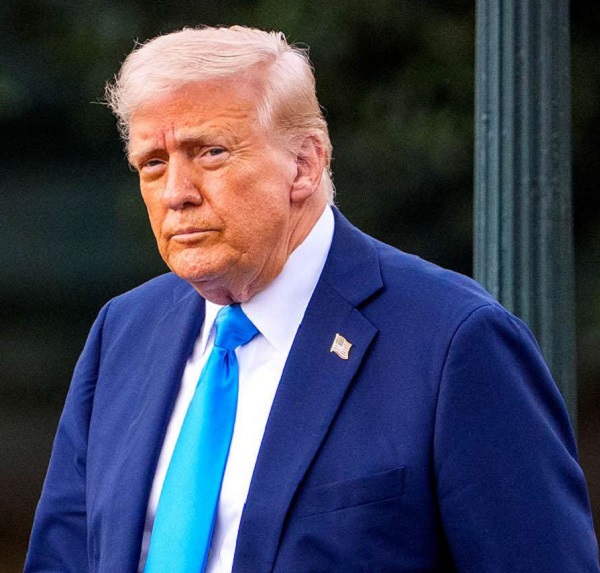by PASIPANODYA NZARAYAPENGA in New York, USA
NEW YORK – IN a move that has reignited debates over immigration policy, the United States President Donald Trump has announced a sweeping new travel ban affecting 19 countries, with 12 facing outright entry prohibitions and seven others seeing partial restrictions.
The policy, set to take effect on June 9, 2025, has drawn sharp criticism, particularly due to its disproportionate impact on African nations.
Among the affected countries is Sierra Leone, a nation with deep historical ties to the United States, particularly as one of the destinations for freed African Americans following the transatlantic slave trade.
The announcement has left many questioning the motivations behind the ban and the specific inclusion of Sierra Leone.
With implications that stretch beyond immigration concerns into historical reflection and diplomatic relationships, the decision warrants a close examination of the possible reasons, the broader context of Trump’s immigration strategy, and the expected repercussions.
The newly implemented restrictions bar nationals from Afghanistan, Burma, Chad, the Republic of the Congo, Equatorial Guinea, Eritrea, Haiti, Iran, Libya, Somalia, Sudan, and Yemen from entering the U.S. entirely.
Additionally, citizens of Burundi, Cuba, Laos, Sierra Leone, Togo, Turkmenistan, and Venezuela face partial restrictions, meaning certain visa categories, such as work and student visas, have been suspended.
According to official statements, the administration claims the policy is rooted in national security concerns, arguing that travelers from these countries pose a potential risk due to either weak vetting systems in their home nations, high visa overstay rates, or refusal by some governments to accept deported individuals.
However, critics argue that the ban echoes past attempts to curtail immigration based on nationality rather than genuine security threats.
The inclusion of Sierra Leone has sparked confusion among analysts and immigration advocates, particularly given its historical connections with the U.S. during the post-slavery era.
While other countries on the list have been previously flagged for security concerns or non-cooperation in deportation procedures, the rationale behind Sierra Leone’s partial restrictions remains unclear, requiring a deeper analysis of the administration’s motivations.
Sierra Leone, located on the West African coast, has a unique relationship with American history.
In the late 18th and early 19th centuries, freed African-Americans were sent to Freetown, Sierra Leone, a settlement established by British abolitionists.
It became a refuge for liberated slaves, forming an enduring connection between the country and the broader Atlantic world.
Given this context, many observers find it perplexing that Sierra Leone has been added to a policy that restricts entry based on supposed security concerns.
Although the administration has yet to provide a clear explanation for Sierra Leone’s partial ban, several factors may be at play. One possible justification is the country’s visa overstay rate.
Similar to Haiti—another nation affected by the restrictions—Sierra Leone may have been flagged due to reports of nationals overstaying visas in the U.S., an issue that the Trump administration has used in past immigration decisions.
If overstay numbers are disproportionate, the government may argue that stricter regulations are necessary to ensure compliance with visa terms.
Another factor could be concerns related to security screening and vetting procedures. While Sierra Leone has generally maintained stability compared to other African nations listed in the ban, immigration policies under the Trump administration have often cited concerns over vetting methods.
Countries with reportedly weak passport or visa verification systems have been targeted in previous bans. Although Sierra Leone does not have widespread geopolitical conflicts, its inclusion may stem from a perceived lack of stringent vetting standards.
Beyond these technical considerations, some analysts believe Sierra Leone’s inclusion could be part of a broader immigration strategy aimed at reducing migration from regions the administration perceives as high-risk.
Historically, African nations have been disproportionately affected by restrictive immigration measures, despite lacking evidence that their nationals pose unique security threats.
The addition of Sierra Leone to the travel ban list might reflect a broader push to curtail immigration rather than an explicit reaction to security concerns.
Trump’s new travel ban aligns with his administration’s ongoing approach to immigration, emphasizing strict border control and national security measures.
His presidency saw multiple iterations of travel bans, beginning with the controversial 2017 executive order that barred entry from several Muslim-majority nations. Although legal challenges forced adjustments to the policy, the administration continued refining its approach, adding countries based on perceived risk factors.
With the 2025 ban, the emphasis appears to be shifting toward nations with higher visa overstay rates and weaker vetting procedures rather than solely focusing on regions linked to terrorism concerns.
This framing allows the administration to argue that the policy is data-driven rather than discriminatory. However, critics contend that the disproportionately high number of African nations affected suggests an implicit bias in targeting specific regions.
Beyond the political discourse, the ban is expected to have tangible consequences for individuals and businesses.
Sierra Leoneans who rely on travel to the U.S. for work, education, or family reunification now face barriers that complicate their plans. Students accepted into American universities may find their visas suspended, professionals may struggle to obtain work permits, and families seeking to reconnect may experience delays or outright denials in their travel applications.
The ban also has diplomatic implications. African governments have historically reacted negatively to restrictive immigration policies that disproportionately affect their citizens.
Sierra Leone, despite its historical ties to the U.S., may view the policy as an unjustified measure that strains relations. Previous travel bans have led to retaliatory moves, where affected countries impose their own restrictions on American visitors or reconsider trade agreements. The extent of Sierra Leone’s response remains uncertain, but the ban risks fostering resentment among nations that feel unfairly targeted.
As with previous travel bans, legal challenges may emerge, particularly if advocacy groups argue that the policy discriminates based on nationality rather than concrete security concerns.
Past bans faced lawsuits that cited constitutional violations and claims that they disproportionately affected specific racial and religious groups. Should a similar challenge arise, courts may evaluate whether the ban serves a legitimate national security interest or if it disproportionately affects African nations without valid justification.
Socially, the ban rekindles conversations about immigration equity and the treatment of African nations in U.S. policy. Critics have pointed out that restrictive measures disproportionately affect countries with historically disadvantaged populations, raising ethical concerns about the fairness of such policies.
The fact that Sierra Leone—a country with historical ties to America’s post-slavery resettlement efforts—is included in the partial restriction list has added layers of complexity to the debate. Many argue that the decision seems to contradict the principles of inclusivity and historical recognition.
Trump’s new travel ban has reignited fierce debate over immigration policy, national security justifications, and the broader implications for African nations. While the administration cites visa overstay rates, security vetting concerns, and refusal by certain countries to accept deported individuals as reasons for the restrictions, critics argue that the policy disproportionately targets African nations and reflects an ongoing pattern of exclusion.
Sierra Leone’s inclusion in the ban is particularly thought-provoking given its historical ties to the United States.
While potential explanations—such as visa overstay rates and vetting procedures—have been speculated, the broader implications raise concerns about diplomatic relationships and immigration fairness.
The ban’s impact will be felt by students, professionals, and families seeking to travel between Sierra Leone and the U.S., adding obstacles to previously accessible avenues.
As legal challenges and diplomatic responses unfold, the policy’s long-term effects remain uncertain. Whether the ban withstands scrutiny or faces revisions will depend on legal interpretations and political shifts.
Regardless, the decision prompts critical reflections on the intersection of immigration policy, historical awareness, and international relations.




